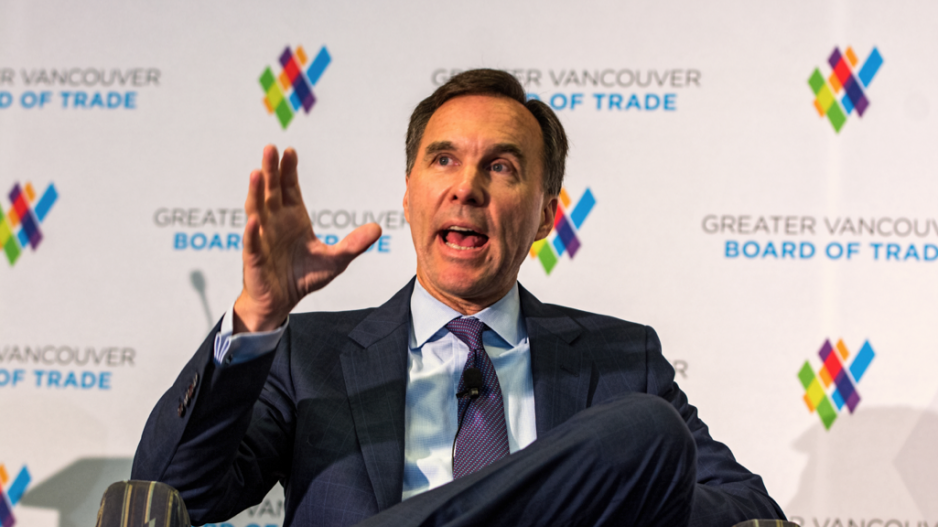Between balancing the budget and addressing Canada’s competitiveness, finance minister Bill Morneau says government rightly chose to prioritize the latter in its fall economic update last week.
“We had to make a choice, so the choice we made was that, we believe, in order to ensure that that competitive situation is addressed, that we have those investments for the long term,” said Morneau.
“If we don’t do that, we’ll be facing a much more uncertain and a much more difficult future where, without those investments, we don’t have the jobs, we won’t have the growth that we need in order to fuel the continuing opportunities,” he said. “We think that’s the more fiscally responsible way to do it, frankly.”
Morneau told Greater Vancouver Board of Trade (GVBOT) members on Monday morning that Canada has the lowest level of debt as a function of gross domestic product (GDP) among G7 countries, and argued that fast-tracking progress toward a balanced budget would have meant foregoing the government’s new tax measures.
“I guess it is a question of focus. We always recognize we need to do both: we need to make investments and we need to be fiscally responsible. But you need to think about from where you’re coming. And from where we’re coming is that very positive balance sheet.”
In his speech, Morneau addressed three areas of concern he said surfaced time and again in his conversations with businesses and associations across the country: taxation, regulation and trade.
Tax cuts south of the border last year cut the United States’ corporate tax rate down to 21% from 35%. By comparison, British Columbian businesses face a general corporate tax rate of 27% when provincial and federal rates are combined.
However, Morneau explained that government didn’t find it necessary to look at tax rates to address concerns about Canada’s competitiveness.
“What we’re concerned about is the next investment,” said Morneau, who introduced three key tax measures last week aimed at enhancing business confidence in Canada: an accelerated capital cost allowance, and immediate expensing for clean energy equipment, and manufacturing and processing machinery and equipment.
Between fiscal years 2018-2019 and 2023-2024, government estimates the new measures will cost more than $14.4 billion.
According to Morneau, the measures mean there is now a five-percentage-point tax advantage for businesses who choose to invest in Canada over the U.S. – an advantage he says didn’t exist several months ago.
Morneau also told members that the government’s acquisition of Trans Mountain Corporation, its pipeline and its expansion project was “a very significant attempt” on the part of government to deal with Canada’s challenging and often controversial regulatory environment.
“It was absolutely not our first choice to buy Trans Mountain,” said Morneau, who maintained that government does plan on returning the project to the private sector when the time is right, though shed no light on when that may be.
He also stated the federal government’s intention to address the regulatory burden that can afflict interprovincial trade, and to work with provinces to reduce those regulatory barriers.
More broadly on trade, Morneau discussed the importance of educating small- and medium-sized businesses on the trade and export opportunities that exist outside of North America.
“What we haven’t been as successful at is actually making those actual trade deals as a result of those trading agreements,” said Morneau. He said government is targeting a 50% increase in overseas exports by 2025.
This morning, General Motors announced its plan to close its Oshawa, Ontario facility in 2019 as part of a global restructuring program that will shutter five plants in total. It remains unclear how many of the facility’s 2,800 workers will lose their jobs, and while Morneau refrained from commenting directly on the news, he stated with confidence that he thinks the news was “totally separate” from Canada’s new free-trade arrangement with the U.S. and Mexico.
“I suppose it reflects their business realities,” he said. “What we will do is we will be looking to ensure that we support the workers through what will be a significant challenge. We’ll have more to say about that as we understand their timing and the issues.”




